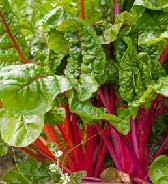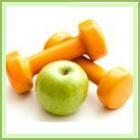Lose Weight
![]() Calories in Food
Calories in Food
![]() Calories in Vegetables
Calories in Vegetables
![]() Calories in Swiss Chard
Calories in Swiss Chard
Calories in Swiss Chard, Nutrition Facts and Health Benefits
How many calories in Swiss Chard? See below, the Swiss Chard calories for the different serving sizes. We provide you with Swiss Chard nutrition facts and the health benefits of Swiss Chard to help you lose weight and eat a healthy diet.
Chard is a lovely green leafed vegetable, distinguished by a red stem and red veins. Chard can either be cooked, similar to Spinach, or used raw on a salad.
Chard is an excellent source of vitamins A, K, beta carotene and potassium. In addition it provides a source of vitamins C, B1-B3, B5, B6, B9 (folate), E, calcium, magnesium, phosphorus and more. It’s low in calories too.
Chard is full of antioxidants and brings with it many health benefits. It is thought to be beneficial to people with diabetes given the benefits it brings to regulation of blood sugar levels. Other Swiss Chard benefits include its anti-inflammatory agents, and maintenance of healthy bones.
See our vegetable calories comparison chart to compare calories in Swiss Chard with the other calories in vegetables.
Also, have a look how nutritious Swiss Chard is in comparison to the other vegetable nutrition facts.

Calories in Swiss Chard, Raw
Refuse: 8% (Tough stems and damaged leaves)Scientific Name: Beta vulgaris subsp. vulagaris
| Serving Size | Calories per Serving |
| 100 grams | 19 kcal (79 kJ) |
| 1 cup, 36 grams | 7 kcal (28 kJ) |
| 1 leaf, 48 grams | 9 kcal (38 kJ) |
Calories in Swiss Chard, Cooked, Boiled, Drained
Refuse: 0%| Serving Size | Calories per Serving |
| 100 grams | 20 kcal (84 kJ) |
| 1 cup, chopped, 175 grams | 35 kcal (147 kJ) |
Swiss Chard Nutrition Facts
| Nutritional value per 100 g (3.5 oz) | ||
|---|---|---|
| Proximates: | ||
| Nutrients | Chard, Swiss, Raw | Chard, Swiss, Cooked, Boiled, Drained, Without Salt |
| Water | 92.66 g | 92.65 g |
| Energy | 79 kJ (19 kcal) | 84 kJ (20 kcal) |
| Carbohydrates | 3.74 g | 4.13 g |
| Fiber | 1.6 g | 2.1 g |
| Sugars | 1.10 g | 1.10 |
| Total Fat: | 0.20 g | 0.08 g |
| Cholesterol | 0 mg | 0 mg |
| Protein | 1.80 g | 1.88 g |
| Minerals: | ||
| Calcium, Ca | 51 mg (5 %) | 58 mg (6 %) |
| Iron, Fe | 1.80 mg (10 %) | 2.26 mg (13 %) |
| Magnesium, Mg | 81 mg (20 %) | 86 mg (22 %) |
| Phosphorus, P | 46 mg (5 %) | 33 mg (3 %) |
| Potassium, K | 379 mg (8 %) | 549 mg (12 %) |
| Sodium, Na | 213 mg (9 %) | 179 mg (8 %) |
| Zinc, Zn | 0.36 mg (2 %) | 0.33 mg (2 %) |
| Copper, Cu | 0.179 mg (9 %) | 0.163 mg (8 %) |
| Manganese, Mn | 0.366 mg (18 %) | 0.334 mg (18 %) |
| Selenium, Se | 0.9 mcg (1 %) | 0.9 mcg (1 %) |
| Vitamins: | ||
| Vitamin C | 30 mg (50 %) | 18 mg (30 %) |
| Thiamine (Vit. B1) | 0.040 mg (3 %) | 0.034 mg (2 %) |
| Riboflavin (Vit. B2) | 0.090 mg (5 %) | 0.086 mg (5 %) |
| Niacin (Vit. B3) | 0.400 mg (2 %) | 0.360 mg (2 %) |
| Pantothenic acid (B5) | 0.172 mg (2 %) | 0.163 mg (2 %) |
| Vitamin B6 | 0.099 mg (5 %) | 0.085 mg (4 %) |
| Folate (Vit. B9) | 14 mcg (4 %) | 9 mcg (2 %) |
| Vitamin B12 | 0 mcg (0 %) | 0 mcg (0 %) |
| Vitamin A | 6116 IU (122 %) | 6124 IU (122 %) |
| Vitamin E | 1.89 mg (9 %) | 1.89 mg (9 %) |
| Vitamin K | 830 mcg (1038 %) | 327.3 mcg (409 %) |
| Percentages are relative to US Recommended Daily Intake (RDI) for adults. | ||
Author: Lana Soko
You Might Also Like:
Like This Page?
|
Share This Page:
|
Search Our Site:

Free E-Book:
We Recommend:
Looking to get your body into great shape? Get the very best results for your efforts and money! Save your valuable time from surfing the internet. These are theBestselling Weight Loss Programs

Programs that work and have thousands of satisfied customers worldwide!

 |




